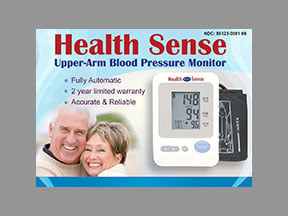
Health Sense Bp Monitor Coupons & Savings Card – Discount Prices from $155.22
My prescription
Edit
1, Health Sense Bp Monitor (1 Device)
Select pharmacy

Albertsons
$155.22
COUPON PRICE
Walgreens
$155.22
COUPON PRICEHealth Sense Bp Monitor savings card
Show this card to your pharmacist
Albertsons
$155.22
BIN
ID
PCN
GRP
011867
LHEB8DD8E8
HT
LABH001
Powered by
Price history for Health Sense Bp Monitor
1 Device, 1nan
Average retail price for Health Sense Bp Monitor
Average SaveHealth price for Health Sense Bp Monitor
Our price history data is based on aggregated prescription data collected from participating pharmacies in America. Our prescription data updates daily to reflect the latest price changes. If you notice a missing data point, it means there wasn't sufficient data available to generate a monetary value for that date.
*Retail prices are based on pharmacy claims data, and may not be accurate when we don't have enough claims.
Health Sense Bp Monitor dosage forms
Dosage Quantity Price from Per unit 1nan 1 Device $156.32 $156.32
| Dosage | Quantity | Price from | Per unit |
|---|---|---|---|
| 1nan | 1 Device | $156.32 | $156.32 |
Using the SaveHealth discount card, what is the price of Health Sense Bp Monitor without insurance?
Using the SaveHealth discount card, the price of Health Sense Bp Monitor without insurance is $155.22.
What is the price of Health Sense Bp Monitor at Walgreens?
The price of Health Sense Bp Monitor at Walgreens is $155.22.
